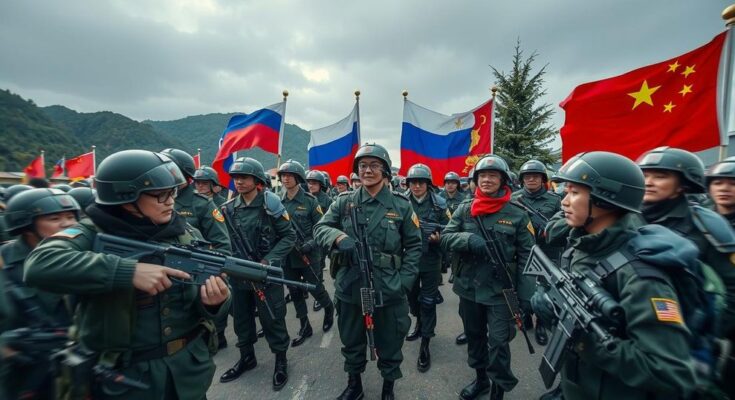North Korea’s deployment of over 10,000 troops to Russia complicates China’s diplomatic balancing act as international leaders urge President Xi Jinping to intervene. This situation strains China’s position amidst growing military ties between Pyongyang and Moscow, evoking concerns related to the Ukraine conflict and potential repercussions for China’s global standing. China continues to navigate these challenges while attempting to maintain its economic relations with the West.
In recent weeks, North Korea has dispatched over 10,000 troops to Russia, complicating the diplomatic landscape for Chinese President Xi Jinping, who faces pressure from global leaders to intervene. During the G20 summit and APEC meetings, Xi was urged by leaders including German Chancellor Olaf Scholz and South Korean President Yoon Suk Yeol to address this escalating military cooperation. They highlighted that North Korean troop involvement represents a dangerous progression in the conflict with Ukraine, contradicting Beijing’s calls for de-escalation.
As Xi met with Brazilian President Luis Inacio Lula da Silva, he emphasized the necessity for dialogue and a peaceful resolution to the Ukraine war, outlined in a six-point consensus proposed alongside Brazil earlier this year. However, while acknowledging the concerns raised, China appears hesitant to confront North Korean leader Kim Jong Un due to the intricate geopolitical ties with both Pyongyang and Moscow, which they perceive as critical to countering perceived U.S. influence in the region.
Analysts suggest that Beijing’s approach is rooted in a balance of interests, prioritizing its relationship with Russia over confronting North Korea, especially amidst increasing tensions with the United States. Additionally, despite evidence of supplying dual-use goods to Russia that could enable further military actions in Ukraine, China remains careful not to alienate any key allies in this complex scenario. While Xi Jinping advocates for peace, the dynamics of the Russia-North Korea partnership risk making it increasingly challenging for China to maintain a neutral stance without jeopardizing its strategic interests.
Patricia Kim of the Brookings Institution articulated the gravity of the situation by stating, “Beijing currently finds itself in a tricky situation.” Furthermore, Joseph DeTrani emphasized China’s reluctance to exercise its influence over North Korea due to the delicate nature of U.S.-China relations. Ultimately, observers note that the Chinese leadership will likely balance the imperatives of international diplomacy while still refraining from overtly supporting the Russian military actions in Ukraine, striving to safeguard regional stability and its economic interests.
The military collaboration between North Korea and Russia poses significant implications for regional stability and international relations, particularly affecting China’s diplomatic strategy. As these developments unfold, China’s role as a mediator becomes increasingly scrutinized by world leaders, who appeal for its influence over North Korea amidst growing military tensions linked to the conflict in Ukraine. This situation highlights the intricate balance China seeks to maintain between supporting its allies and not jeopardizing international negotiations geared towards conflict resolution.
In conclusion, North Korea’s troop deployment to Russia presents a considerable challenge for China, necessitating a careful diplomatic balancing act. Despite facing pressure from global leaders, China appears reluctant to openly confront either North Korea or Russia, valuing its strategic partnerships and economic stability over directly intervening in the conflict implications. The situation illustrates the complexities of international relations and underscores the significant role of China as a potential mediator amid escalating global tensions. As events progress, China’s responses will be closely observed for their impact on both regional security and wider geopolitical dynamics.
Original Source: www.voanews.com




